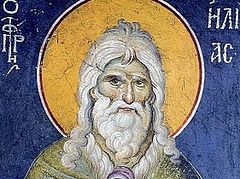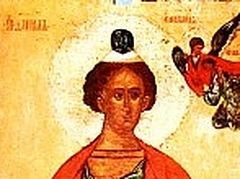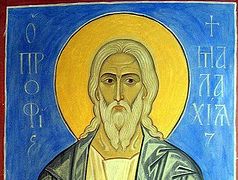The book is small, only three chapters of the Old Testament. In the Neo-Pentecostals’ point of view, the book of Joel confirms their way of life.
Holy Prophet Joel
 Holy Prophet Joel
Holy Prophet Joel Most often from the book of Joel is cited the verse on the Spirit of God: I will pour out my spirit upon all flesh; and your sons and your daughters shall prophesy, your old men shall dream dreams, your young men shall see visions: And also upon the servants and upon the handmaids in those days will I pour out my spirit. (Joel 2:28-29). The apostle Peter recalled these words on the glorious day of Pentecost, when the Holy Spirit descended and the apostles began speaking in many different languages. The Apostles preached to people who had come from different countries to Jerusalem for the feast.
One hundred years ago, Pentecostals spoke in many “foreign tongues”,[1] and a half a century later came the Neo-Pentecostals.[2] They spoke and believed that the Holy Spirit had descended upon them. In the beginning, Pentecostals even tried to preach in “foreign tongues” on distant missionary trips. To their own bewilderment the hapless missionaries found that these foreign peoples did not understand a word they were saying. Then they decided that this gift from above was give to them not to preach to people, but to pray to God: He had entrusted them with these “foreign tongues,” it would follow that He Himself understands them. The Pentecostals were more or less satisfied with this explanation.
Meanwhile, the apostles had the gift of speaking in foreign tongues—to people. And on the day of Pentecost the people who had come from afar with amazement recognized the languages of their own countries. They gradually understood that a miracle was happening: unlearned men, the apostles, through a gift from above became “polyglots,” “translators,” preachers and prophets.
In our days there are many Neo-Pentecostals who with utter immodesty call themselves prophets. Some of them gleefully take up the book of Joel and read the verses speaking of God’s blessing, which multiplies the harvest in the vineyards, the sheep and cattle in the pastures, and protects from aggressive neighboring peoples. The Neo-Pentecostal “prophets” love these verses from the Book of Joel with all their hearts. They preach a theology of prosperity: The good, almighty God blesses His chosen one with all material blessings. This is how they interpret the Holy Scriptures—entirely in the spirit of a consumer society.
* * *
 Fresco of the holy Prophet Joel in the monastery of Gracanica, Kosovo, Serbia, c. 1321
Fresco of the holy Prophet Joel in the monastery of Gracanica, Kosovo, Serbia, c. 1321 First of all about the disasters that befell the people of God: For a nation is come up upon my land, strong, and without number, whose teeth are the teeth of a lion, and he hath the cheek teeth of a great lion. He hath laid my vine waste, and barked my fig tree: he hath made it clean bare, and cast it away; the branches thereof are made white. Lament like a virgin girded with sackcloth for the husband of her youth. The meat offering and the drink offering is cut off from the house of the Lord; the priests, the Lord's ministers, mourn. (Joel 1:6-9). What can be done? Is not the meat cut off before our eyes, yea, joy and gladness from the house of our God? (Joel 1:16). Here is what saith the Lord, turn ye even to me with all your heart, and with fasting, and with weeping, and with mourning: And rend your heart,[3] and not your garments, and turn unto the Lord your God: for he is gracious and merciful, slow to anger, and of great kindness, and repenteth him of the evil. (Joel 2:12-13).
It is easy to rend your clothing. It is much harder, much more torturous to humble a heart that is hardened in sin. It is easy to make your garments abstemious and funereal. But how can you make your heart abstemious and repentant? We have to somehow get to the heart. After all, any of our most correct external actions without inner effort cannot help us return to God.
Whoever turns to God receives from Him forgiveness of sins, spiritual joy, and weighty support. To them, to the truly repentant, the Lord says through the prophet: I will pour out my spirit upon all flesh; and your sons and your daughters shall prophesy… And it shall come to pass, that whosoever shall call on the name of the Lord shall be delivered ... in Jerusalem shall be deliverance, as the Lord hath said, and in the remnant whom the Lord shall call (Greek: whom the Lord shall evangelize—evangelizomini), (Joel 2:28, 32[2]).
That is how it happened. St. John the Baptist came—a strict faster—and called all the people to repentance. By far not everyone responded. Nevertheless, many heard his prophetic voice and humbled their hearts. The Baptist directed people to the Lord Jesus Christ. Some cleaved to Christ, and became His disciples. They were tormented seeing the suffering Christ, they grieved over His death, and rejoiced with all their souls over His Resurrection. They, the close disciples, received the Holy Spirit and preached the Gospel in Jerusalem in foreign tongues. People understood them, called upon the name of the Lord in repentance, and found salvation … but lived in different ways. They knew how to live in both want and abundance; and they gave thanks to God for everything.
Yes, the apostles had the gift of foreign tongues. What is this gift? It is simply the ability to speak in a foreign language without previously studying that language. The apostle preached in foreign tongues as they did in their native language—entirely self-composed and in control of themselves, without various ecstatic expressions. The gift of tongues for the (Neo) Pentecostals is for some reason full of ecstasies. Even their repentance is practiced with particular ecstasy. At first the exalted person repents of the sins committed in his past life, and then he receives the ecstatic gift of prophecy. Then at the Neo-Pentecostal gathering the moment comes when they remove the emotional tension of ecstasy with soft, calming music. After listening to the “lulling” music they move on to the sermon. The pastor begins his rousing sermon with a bracing voice. At the end of the sermon he shouts out verses from the Book of Joel and, slowing down with great significance, heavily dropping each word, pronounces, “Today… our brother … was baptized … with the Holy Spirit …” Suddenly the entire congregation bursts forth, “Alleluia!!!” After the gathering people depart to their homes smiling gently: “A great church service has taken place with us today. There it is—the mighty anointing of the Holy Spirit.”
You can conduct similar gatherings, you can even spend the rest of your life following this outline: a phase of ecstatic arousal, a phase of slowing down, a rallying phase, then of easing up. You can do all that. Only what does this have to do with the Book of Joel? St. Joel was in no way prophesying about these ecstasies. There has never been a deficit of ecstasies—in all peoples and throughout all the ages.




